Stories of Notre Dame Law School's Class of 2024 Graduates
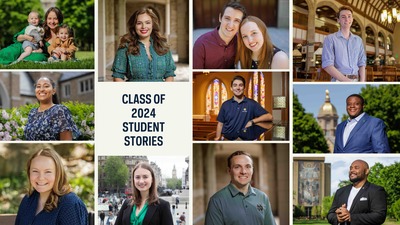
This weekend we will celebrate Commencement with the Notre Dame Law School Class of 2024, marking the culmination of their academic journey and the beginning of their legal careers.
Every student arrived here with a unique story, bringing diverse backgrounds, life experiences, and perspectives. During their time here at Notre Dame Law School, they've discovered their individual paths — their personal meanings — to become a “different kind of lawyer.”
Meet twelve of our outstanding graduates. Through their experiences, they embody the essence of our mission, demonstrating diverse ways in which they've embraced and enhanced Notre Dame Law School, the wider University community, and beyond.
Jump to:
Sarah Anderson
Callie Chaney
Morgan and Sam Gafford
Colton Gregg
Quiazia Huerta
Bray McDonnell
Macio Sexton, Jr.
Bernadette Shaughnessy
Arlinda Shehu
Will White
Jamal Wilson
Sarah Anderson
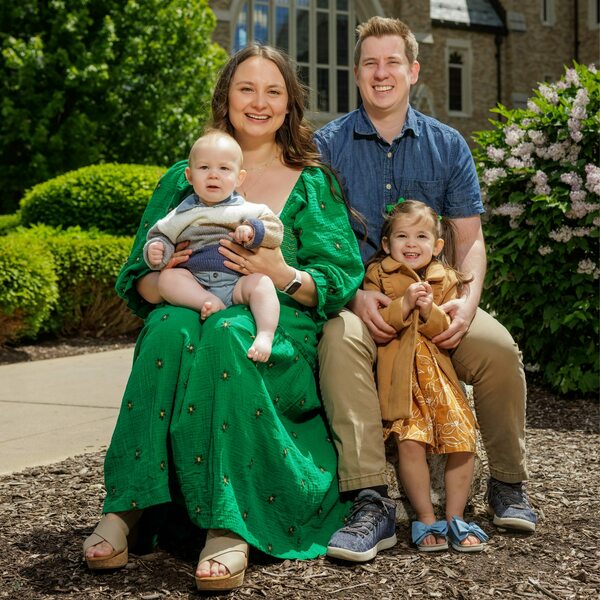
For Sarah Anderson, beginning law school wasn’t solely about adjusting to the academic rigor and learning case law and legal theories — it was also balancing these demands with the joys and challenges of motherhood. Sarah started law school with a newborn daughter and welcomed her second child — a son — during her third year.
“It was challenging, but it put things into perspective,” said Sarah. “People really stressed about doing well in school, but I was forced to feel it less because I had other things going on. Don’t get me wrong, I definitely felt stressed, but I had to be very efficient with my time so when I was home, I could be fully present with my family and children.”
Late nights were routine, and Sarah usually studied from 8 p.m. to 2 a.m. “When my kids woke up in the middle of the night, nursing them was my study break. My husband would then whisk them away so I could continue studying."
She says her professors were very supportive. “That has been a blessing being at Notre Dame. People are not just understanding, but celebratory,” said Sarah.
In addition, Sarah commutes to campus over an hour each way. “My husband works outside of Chicago, and it was very important for us to be home with our family every day. So, we chose to live in the middle and commute out.”
After earning her undergraduate degree in mechanical engineering from Brigham Young University, she worked for five years as a mechanical engineer. Initially, law school wasn't on her radar, but as she contemplated advanced degree options, she was drawn to the field of law.
Sarah chose ND Law for its ranking and the opportunity to learn about a different side of Christianity. Additionally, she sought a place that fostered individual authenticity. As a member of the Church of Jesus Christ of Latter-day Saints, Sarah said, “I appreciate that Notre Dame as a Catholic school embraces diversity in religious beliefs.”
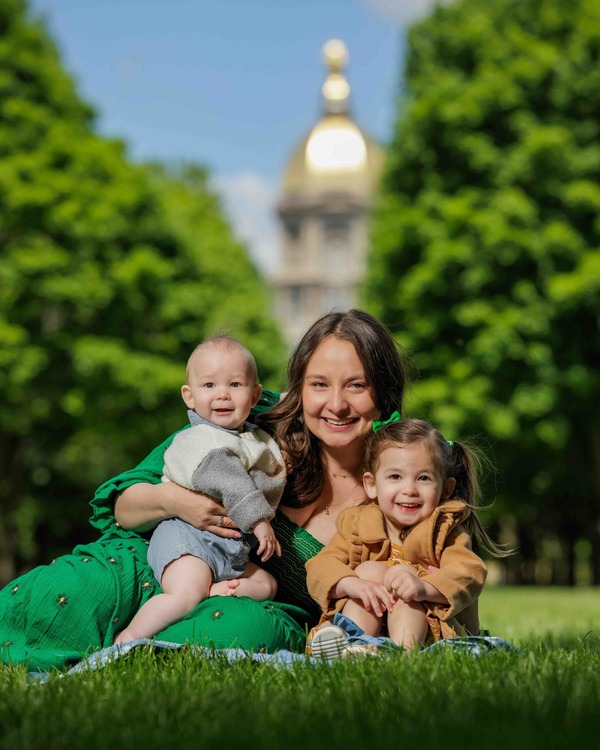
During law school, Sarah participated in activities that complemented her lifestyle, such as the Notre Dame Law in Chicago Externship, where she worked at the non-profit agency Hammond Legal Aid, conveniently located near her home.
"At Hammond Legal Aid, I came to realize the widespread lack of legal understanding and the challenges many face in navigating the law," said Sarah. "Being with individuals during some difficult moments, providing essential legal guidance, and witnessing the vital role of legal services firsthand, I felt genuinely privileged to offer assistance.”
She also participated in the Mediation Clinic, where she assisted people with sensitive and intimate aspects of their lives. "When we reach an agreement, you feel like you are genuinely helping people, and I had an extra pep in my step," she said.
Sarah spent both her summers at Perkins Coie LLP in San Diego, California, focusing on patent litigation. Participation in the U.S. Patent and Trademark Office’s National Patent Application Drafting Competition and Intensive Trial Advocacy, along with her engineering background, affirmed patent litigation was for her. The Anderson family will relocate to San Diego, where Sarah will join Perkins Coie after graduation.
At law school, Sarah found resonance in the pursuit of balance as a lawyer. “We all have passions, not just as aspiring attorneys, but as individuals. In the legal profession, there are many demands. Notre Dame emphasizes that a ‘different kind of lawyer’ not only excels as a lawyer, but also recognizes the significance of other aspects of life. Achieving balance in these areas enriches our personal lives and enhances our effectiveness as lawyers.”
For Sarah, navigating motherhood and a legal career has been a balancing act.
“I don’t want to be a mediocre mother and a mediocre attorney. I want to be a great attorney and a great mother,” said Sarah. “Notre Dame Law School has been a great place to give me the tools and the encouragement to be able to do just that.”
Callie Chaney
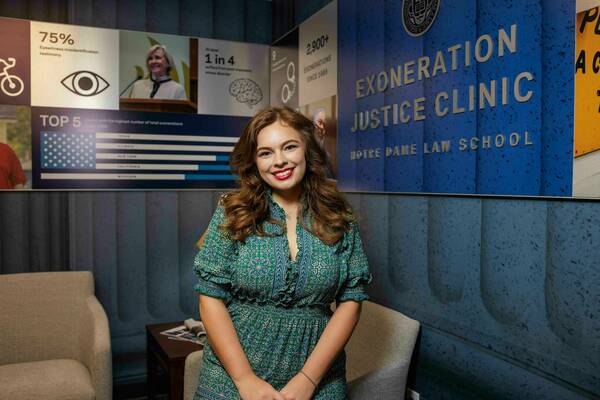
Callie Chaney was born, raised, and educated through her undergraduate studies in the Appalachian Hills. From Hindman, Kentucky, Chaney graduated with her bachelor’s degree in business administration in three years from Alice Lloyd College, a work college that allows students to earn tuition assistance by working through their studies.
Callie chose Notre Dame Law School with the aim of participating in the Notre Dame Exoneration Justice Clinic, an aspiration that came to fruition. For the past two years, Callie has represented three different clients as an intern for the clinic. Her experience included preparing for a deposition, traveling across the United States for investigations, and meeting with her clients in prison. The most meaningful part of her work at the EJC, she says, has been the ability to give her clients hope. She recently received the Tia B. Paulette and Erika S. Gustin Award, for demonstrating a personal and professional commitment to criminal justice while furthering the goals of the Exoneration Justice Clinic.
Her passion for the work of the EJC is also very personal to Callie. Her father was indicted when she was in the eighth grade. He was incarcerated a couple years later, which sparked her passion for providing legal assistance for individuals who have been wrongfully convicted. “I wanted to fight for the daughters of all the other incarcerated fathers, particularly for those whose incarceration is unjust,” she said.
Notre Dame Law School’s Intensive Trial Advocacy and Advanced Trial Practice courses affirmed Callie’s calling to be a litigator. Her theatrical trial openings combined with her natural Southern drawl made for memorable arguments, which her professor described as “some good old-fashioned Kentucky storytelling.” Callie pinned this moment as the first time in her law school career where she felt like she was supposed to be a lawyer. “At that moment, I knew I wanted to be a litigator. I wanted to be in court as a public defender to tell stories in a compelling way to bring justice for my clients.”
Callie has served as a class representative for the Student Bar Association, volunteered for the Law School’s new Special Education Law Clinic, and completed the Appalachian Externship. She used her background in business administration to serve as a consultant for a gold mining company in Ghana as part of her participation in the Business on the Frontlines course at the Mendoza College of Business. Outside of law studies, she starred in the Notre Dame performance of Steel Magnolias as M’Lynn Eatenton.
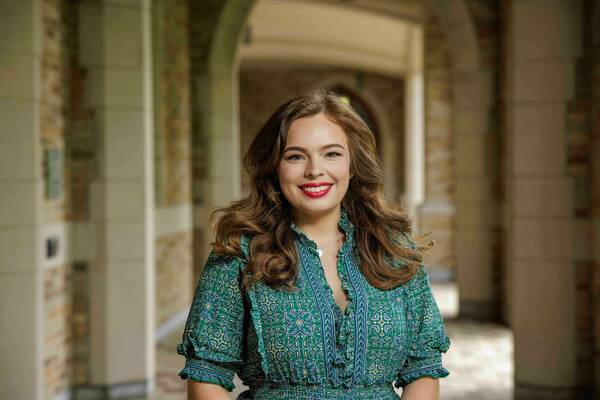
During her summers, Callie worked in the U.S. Attorney’s Office in Billings, Montana and for Lovey and Lovey, a civil rights firm based in Chicago that allowed her to work on civil rights cases in Kentucky.
“There were times that I battled with imposter syndrome and all these things that made me think, ‘Do I belong?’ But at the end of the day, I know I can sit down and talk with somebody, hear their story, and relate to them, and advocate for them, and make them feel heard. And sometimes that’s the best you can do and even better than knowing the books inside and out.”
Callie says that growing up in Kentucky, she always thought she may want to leave. “I’m from a two traffic light town where I have lived my entire life. I thought there was so much out there in the world that I wanted to go see and do and then I got here and realized how much I missed home.” After she graduates, Chaney will move back home to Kentucky and serve as a public defender.
Morgan and Sam Gafford
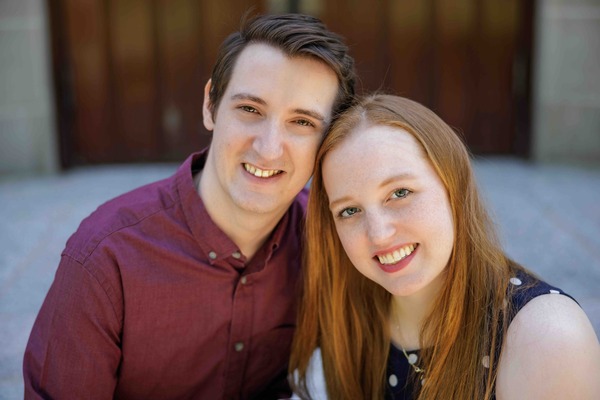
Morgan and Sam Gafford had been married two years and were both teaching English in South Korea when they first contemplated law school. Sam had studied and worked as an accountant after college, and Morgan had studied English before moving to Korea. While there, they took the LSAT, researched their options, and began preparing application materials.
Their approach was to apply to the same schools and see what happened. “We shot high,” said Morgan. “Our marriage is the best thing in the world, but I am my own person, so we went through the process together but as individuals.”
While they waited, they received news in early January 2021 that Morgan's mom had been diagnosed with breast cancer. The next day, Morgan received the email that she had been accepted to Notre Dame. A few minutes later, Sam also received his acceptance email.
“It was the highest of highs with the lowest of lows. Notre Dame was the first school that we got admitted to and I thought it must be a sign. I was raised Catholic and I am fairly religious, so I knew it would be a fit for me, but I also wanted Sam to be comfortable,” said Morgan.
Morgan said that when they visited campus, they sensed something special at Notre Dame. “It is different here,” agreed Sam.
Morgan has been involved in the Women’s Legal Forum, has served as vice president of First Generation Professionals, and was the executive managing editor for the Journal of Legislation. She also participated as a law student in Business on the Frontlines, an MBA program within the Mendoza College of Business.
Initially considering criminal or civil law, Morgan's perspective shifted after her first-year summer in a prosecutor’s office. Then, she took a tax law class and was sold. Her second-year summer at Deloitte reinforced her passion. There, she enjoyed collaboration between lawyers and accountants and opportunities for research and writing. Now, she eagerly anticipates starting her career at Deloitte in Chicago.
Meanwhile, Sam was also discerning his path. He originally thought he would do IP, tax, or criminal law. During his second-year summer, he worked for the DuPage County Prosecutor’s office in Illinois and had the opportunity to participate in trials, and loved it.
“I saw a light in his eyes,” said Morgan. “Law school has been very humbling, and it is completely okay to pursue what makes you happy!”
After graduation, Sam will return to DuPage County to start work as an Assistant State’s Attorney.
While at Notre Dame, Sam served as president of the Tax Law Society and was a senior editor for the Notre Dame Journal on Emerging Technologies. In addition, he worked as a research assistant for Intensive Trial Advocacy and adjunct professor John Conway, an experience he regards as one of his favorites in law school.
For Sam, being a “different kind of lawyer” is not just doing your job but doing it well and knowing there is more to it than just ‘this is my job.’What you do affects others. It has widespread effects on your community, especially in criminal law.”
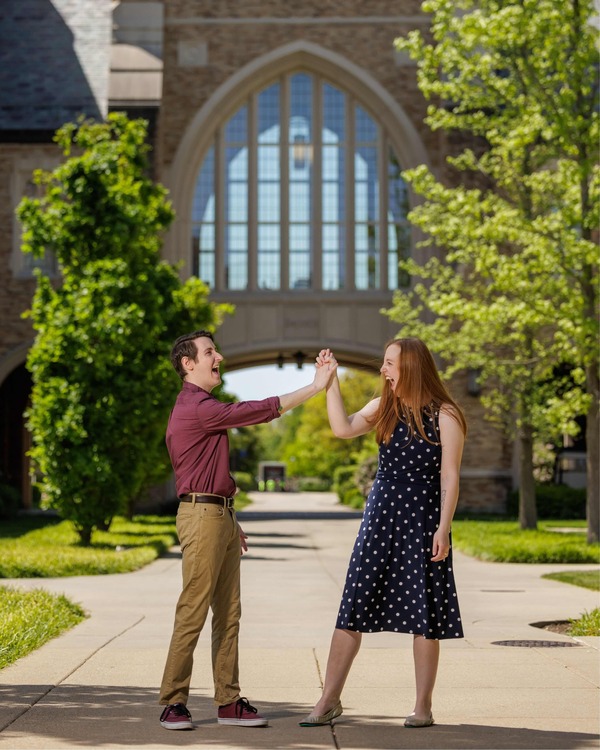
Being a “different kind of lawyer” to Morgan means being a lawyer that is true to yourself. “Don’t be consumed by everything else, but just be who you are. And to me that means being empathetic and compassionate, and listening to people before determining the outcome of their case.”
They said that being in law school together has been a tremendous experience. They both understood the demands and were able to empathize with what each was going through, despite having very different study habits and schedules.
“I am so glad we are doing this together because, if not, we would have had no idea of what the other was experiencing,” said Sam.
“I came from a difficult background and grew up in relative poverty. Just being able to get to college was a struggle,” said Sam. “It has been nice to feel supported here at Notre Dame, even if I don’t have full family support, apart from my siblings. I have felt that here, especially from the Career Development Office.”
“I am really proud of him,” said Morgan. “We met the first week of college at Eureka College. I took his hand, said ‘Come on, let's go!’ and here we are. Doing this together has been so unbelievable.”
Sam and Morgan are the first in their families to graduate from college. They acknowledge the invaluable support of the First Generation Professionals group. And although their children won't be first-generation, they said, “We hope to give back as much as Notre Dame Law School has given to us.”
Colton Gregg
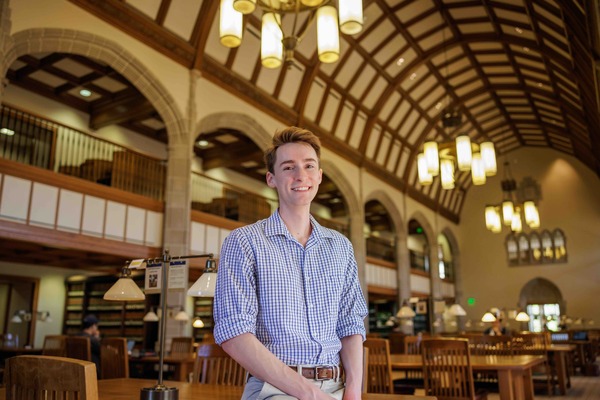
For Colton Gregg, the journey to a J.D. has not been without its challenges. As a first-generation student and a member of the LGBT community, Colton worried that he would feel out of place at Notre Dame. What he found instead was strong mentorship, a close-knit community, and the skills and knowledge he needed to be a “different kind of lawyer.”
A native of Burleson, Texas, Colton earned a degree in finance from the University of Texas at Arlington. He enjoyed the intersection of economics and finance — a subject matter which seemed to lend itself to a career in corporate law.
“I’ve wanted to be a lawyer since I was eight years old,” said Colton. “I applied to law schools and got waitlisted everywhere, which really felt like a sign that I should stay in finance. But, after a year, I still really wanted to be a lawyer.”
When he began applying to law schools, he mostly was looking at schools on the east coast and in Texas, to be close to home.
“Ending up at Notre Dame was a little bit of a happy accident,” said Colton. “But I knew Notre Dame was a good school and I was raised Catholic, so I applied. It ended up being the best option for me. When I came and visited, I just fell in love.”
Colton found a student mentor who showed him the ropes and helped him make connections and feel at home in the Law School. Colton is also the second youngest in the 3L class, and he grappled with imposter syndrome, but found support among fellow students.
“Even though I was worried I didn’t measure up, I was never made to feel ‘less than’ by my classmates,” Gregg said. “People have, by and large, been very willing to bridge the gap and not make me feel othered, and I can’t express how important that’s been for me.”
He is also thankful for faculty members he considers his mentors, including adjunct professor Judge Damon Leichty of the U.S. District Court for the Northern District of Indiana.
“Judge Leichty is more than just a professor to me,” he said. “He’s a brilliant legal scholar and someone I want to emulate in my own legal work. He’s been very gracious and willing to mentor me and other students, and it’s hard to overestimate the scope of the impact he’s had.”
Colton completed an externship with Judge Leichty, which provided a firsthand understanding of the profound impact legal work can have on people's lives.
He is involved with the Notre Dame Journal of Legislation as the executive articles editor and is a member of the LGBT Law Forum.
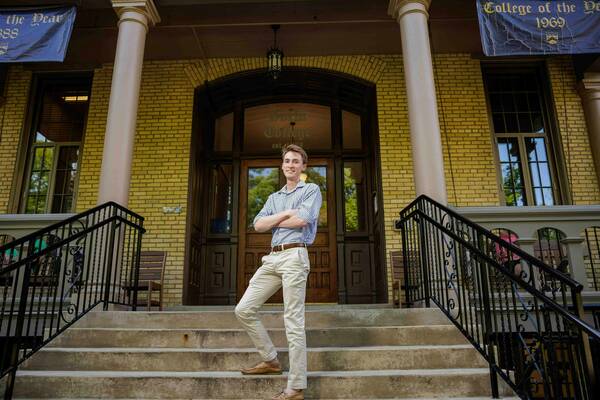
Colton serves as assistant rector at Sorin College, where he mentors young undergraduate men. “Sorin College is one of the smaller dorms at Notre Dame, and I think that’s important because it’s allowed for us to create this close-knit community,” he said. “Our motto is ‘frater pro fratre,’ or, ‘brother for brother,’ which really speaks to the culture of inclusion we have at Sorin.”
After graduation, Colton will join Haynes and Boone, LLP in Dallas as an associate in investment management. He's excited to broaden his legal expertise there, while also promoting financial literacy and making a positive community impact.
“I think that a 'different kind of lawyer’ is a lawyer that recognizes that there’s a greater purpose to being a lawyer than simply billing clients or making money or winning a case,” Colton said. “That greater purpose could be different for different people, but it’s rooted in wanting to benefit others and benefit society as a whole.”
Quiazia Huerta
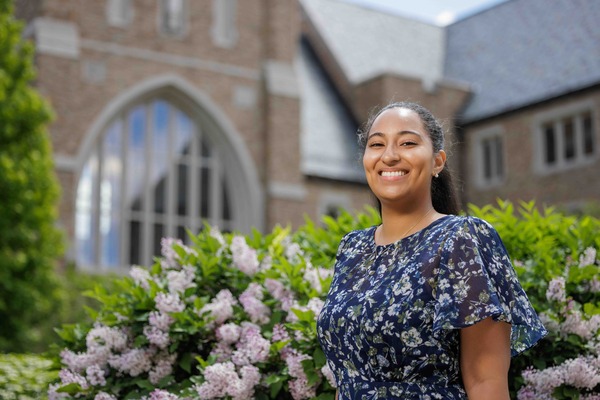
Red and blue lights flashed across four-year-old Quiazia Huerta's face in quick succession as she waited on the curb outside of her childhood home. At a young age, she had no idea what was happening, exacerbated by the fact that she was deaf at the time. In September 2001, the police department and Child Protective Services were called to her house to take custody of Quiazia and her siblings after the court ordered an emergency removal to ensure their safety.
Quiazia entered the foster care system when she was four years old. Until the age of 18, she would visit her local courthouse with her family so that her grandparents could file forms pertaining to their legal guardianship of Quiazia and her siblings. The many appearances that they made in family court marked her first exposure to the judicial system.
“Even at the age of four, I still have vague recollections of the fluorescent lights in the ceiling seemingly guiding our way to the sturdy wooden benches of the courtroom,” said Quiazia. “Although intellectually stimulating at times, within the context of my direct contact with the court system as a foster youth, law felt impersonal.”
But a “Gender and Law” course at her alma mater, the University of California, Los Angeles, challenged her previous perception of law as impersonal. Reading about a myriad of court cases provided Quiazia with snapshots into the lives of the people involved, propelling her to realize that the law and peoples’ personal lives are, in fact, intricately intertwined.
“The judicial and the personal — two things I had once felt were diametrically opposed — merged together,” she said. “The literature I was exposed to strengthened my interest in law, further informing my understanding of its effects and potential remedies.”
During her undergraduate studies, Quiazia was actively involved in Bruin Guardian Scholars, a program that provides foster youth with the necessary resources to excel at UCLA. She was also a fellow in the UCLA Law Fellows Program, which seeks to empower and support underrepresented college students who are interested in pursuing careers in law. After graduating from UCLA with a double major in African American studies and gender studies, Quiazia worked for two years before coming to Notre Dame Law School.
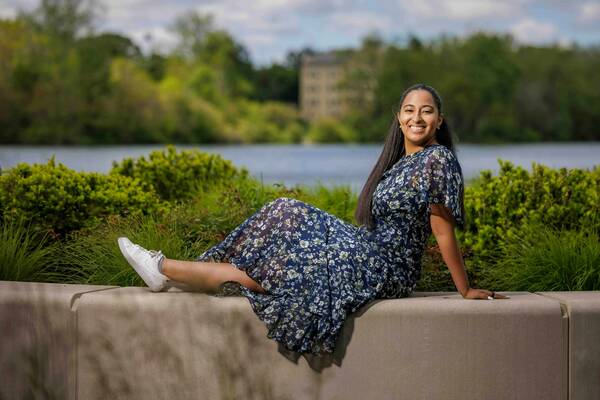
At Notre Dame, Quiazia served as the secretary of the Hispanic Law Students Association and 1L rep for Legal Voices for Children and Youth. She was also a member of the Asian Pacific American Law Students Association, Black Law Students Association, Intellectual Property Law Society, and Notre Dame Journal on Emerging Technologies.
She spent the summer after her first year of law school as an intern at DTE Energy. After her second year of law school, she worked as a legal intern at Canon, which she considers one of her favorite experiences. “They’re just very family-like,” she said. “Everyone at Canon was very encouraging and played an instrumental role in strengthening my practical skills and confidence.”
Quiazia credits her education for wiping away her once-negative associations with the judicial system and for catalyzing a new path for her to serve others. She aspires to do pro bono work in two areas that she is passionate about: family law and foster care reform.
“It will be my privilege to highlight the experiences of those who do not have the same platform I do, being that less than 10 percent of foster youth even graduate from college,” said Quiazia. “It is my duty to represent those who have been impacted by the foster care system to the best of my ability and be a positive force for change.”
Bray McDonnell
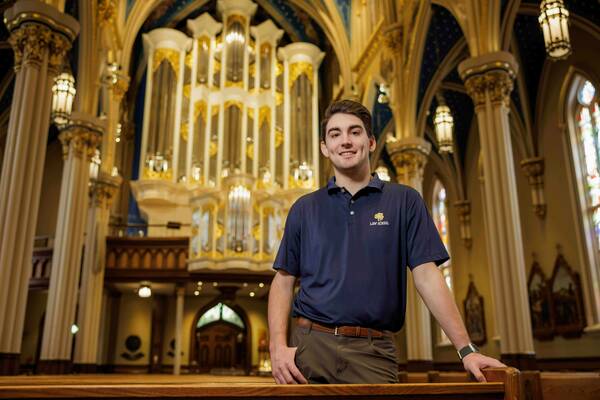
When Bray McDonnell realized that he no longer wanted to work in politics and left Washington, D.C., he came to Notre Dame, where he turned to a distinct, less contentious way to impact his community and engage in public service through legal work.
Bray earned a bachelor’s degree in business administration from George Washington University. While interning with congressional, judicial, and advocacy offices, he initially pursued politics, but found the environment too transactional and hostile. With guidance from mentors, he transitioned out of government to law school, where he feels his true calling lies.
"During my time at George Washington, I enjoyed the legal classes within my major. The teaching style, particularly the Socratic method, challenged me," Bray explained. "While stepping away from the political side of legislative work, I didn’t leave law behind, but I wanted to find a way to interact with the law that put people first and addressed important issues head-on.”
He had heard many positive things about Notre Dame Law School from alumni in his professional network. Bray, having been raised in the Church, also placed a lot of value in Notre Dame’s Catholic mission. Notre Dame, he said, was the obvious choice.
During his time in law school, Bray was engaged in and out of the classroom. He served as the managing symposium editor for the Notre Dame Law Review.
“The Notre Dame Law Review is widely recognized and highly respected, and is certainly an attractive addition to any legal student’s resume,” said Bray. “It’s more than that for me, though. Through my work at the Law Review, I feel that I really played a part in moving legal scholarship forward.”
Bray was also the Vice President for Speakers for the Law School’s Federalist Society chapter. He emphasizes the society's role in fostering respectful engagement and facilitating open dialogue among individuals with differing viewpoints.
For Bray, being a “different kind of lawyer” is about following his conscience and trying to do the most good for the right reasons.
“St. Thérèse of Lisieux spoke about ‘the little way’ of doing things — or, doing small things with great love,” said Bray. “Through my legal work, I want to try and make people’s lives better by making the legal system work better. I want to put people ahead of my own success, and hopefully make a real, lasting impact.”
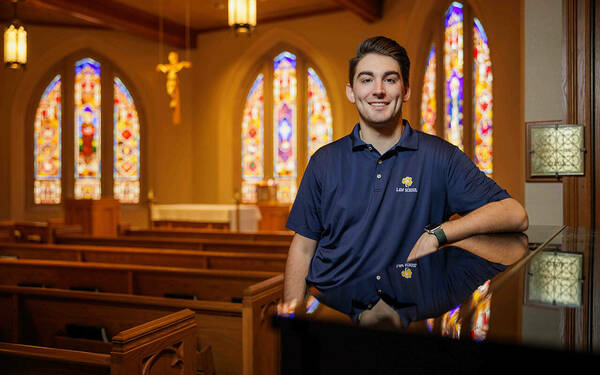
Outside of the classroom, Bray is very involved with music. His musical experience stretches back to when he began piano lessons in the first grade and joined the local boys’ choir in his hometown of San Francisco. He later learned to play the organ — a skill he credits with helping him grow in his faith and as a person. During his time at Notre Dame, he played the organ at the Basilica of the Sacred Heart and acted as music director for the Law School’s St. Thomas More Chapel, where he plays piano for Law School Masses.
After graduation, Bray will clerk for Judge M. Miller Baker on the U.S. Court of International Trade, and will then return to McDermott Will & Emery in Washington, D.C., where he interned during his 2L summer. He is looking forward to working at a firm full of fun and interesting people, and expanding his legal experience through their broad scope of practice. In the future, Bray hopes to focus more on litigation and administrative law to influence public policy and ensure its deliberate crafting.
“It isn’t as glamorous as other kinds of legal work, or ’saving the world,’ so to speak,” said Bray, regarding a career in administrative law. “But any work that is done for the right reasons and with great love has the potential to impact many lives — and that’s the kind of work I can’t wait to do.”
Macio Sexton Jr.
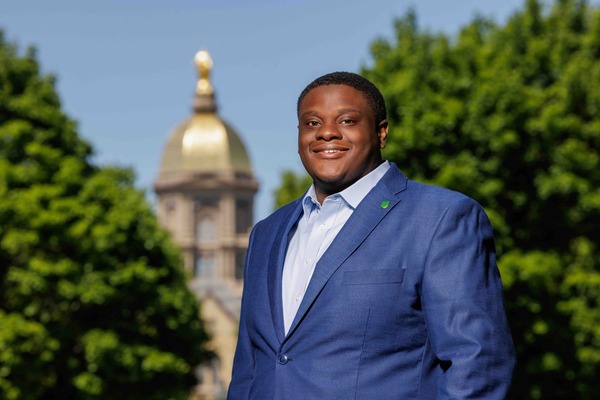
“Breaking barriers and doing the impossible all started with basketball,” said Macio Sexton, Jr. Growing up in Hamilton, New Jersey, basketball was his passion, earning him scholarships to private schools in his early teens. However, fate intervened when he suffered a tibia injury, an event he now regards as a pivotal turning point.
“Before injuring myself, basketball consumed my world. But that setback became a springboard to diverse opportunities. It broadened my horizons, leading me to leadership roles in high school and thriving in various spheres beyond athletics,” said Macio.
An influential high school math teacher suggested a path in mergers and acquisitions law, sparking Macio’s interest in business and law. Macio eventually graduated from the College of William & Mary with a degree in finance with a business analytics concentration.
Macio decided to go straight from his undergraduate studies to law school after reaching out to Notre Dame Law School’s admissions office, which put him in touch with faculty, staff, and alumni. “After going through that experience of speaking with people from Notre Dame and learning its history, I knew that this place was special and somewhere I could see myself excelling,” he said.
Macio has excelled in an array of opportunities both within and beyond the Law School. He served as a legal extern for Notre Dame’s Office of General Counsel, a compliance extern for the Notre Dame Athletics Department, and the alumni manager for the Law School alumni relations office. Additionally, he was a graduate assistant for the director of player development for the Notre Dame Fighting Irish football team, executive articles editor for the Notre Dame Journal on Emerging Technologies, and a member of the Notre Dame Black Law Students Association.
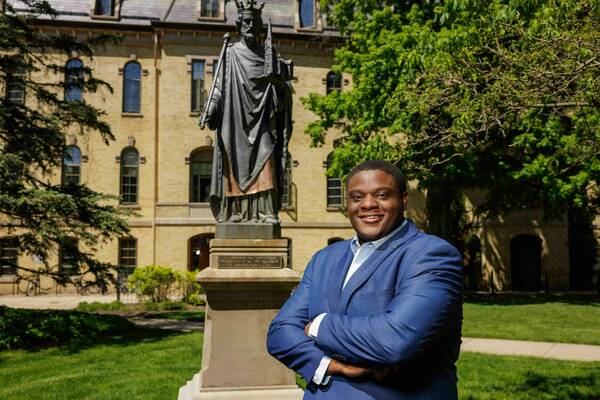
One of his highlights at Notre Dame these past two years was serving as the assistant rector for St. Edward’s Hall, the oldest residence hall on campus. “Being able to act as a role model to the young men of the hall is one of the most rewarding things I’ve done at Notre Dame,” he said. Citing welcome weekend as one of his favorite memories, Macio added, “Welcoming them to a community that thrives on inclusivity and camaraderie is not just a duty, but a privilege.”
He spent the summer after his second year of law school working as a summer associate at Ropes & Gray LLP, which awarded him the prestigious Roscoe Trimmier Jr. Diversity Scholarship.
After his first year of law school, Macio worked as a summer associate at Faegre Drinker in Chicago, where he will be working after graduation. And, it seems that Macio’s high school math teacher was somewhat right. While his work will not focus on mergers and acquisitions deals, Macio will be working in the firm’s investment management group, solving complex regulatory and structural challenges for investment funds –– advising on both business formation and growth.
For Macio, being a “different kind of lawyer” means elevating those around you. “It's understanding that genuine success isn't solely about personal accomplishments, but rather, about the positive ripple effect you create for your clients, colleagues, and community,” he said.
Just like before, Macio is on a trajectory towards breaking barriers and doing the impossible. “Before coming to law school, I didn’t know many lawyers,” he said. “Through becoming a lawyer, I am doing the impossible. I’m doing something for me and my family at the same time.”
Bernadette Shaughnessy
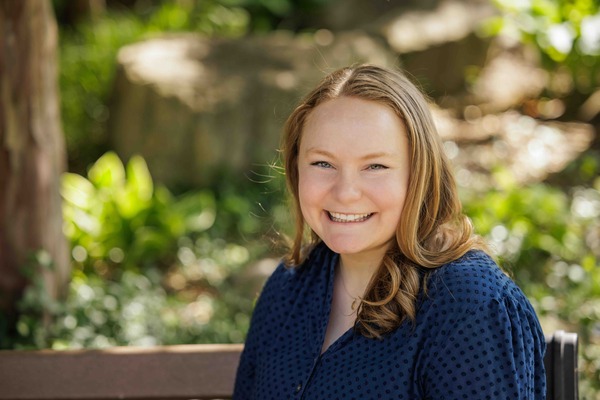
Bernadette Shaughnessy grew up outside of Cimarron, Kansas, a small rural town with a population of around 2,000 people. Her father worked in maintenance at a grain elevator, while her mother stayed at home and worked part-time for a local church.
Bernadette’s Catholic faith has been an integral part of her life from a young age, and her upbringing in southwest Kansas shaped her deep interest in religious liberty issues.
“I grew up in a traditionally Protestant community and a lot of friends and teachers had questions about Catholicism. I was already starting to explain my faith as early as the second grade,” she said. “Being able to stand up for my faith helped me learn to stand up for myself. So, I very much believe in the religious liberty mission.”
While she initially planned to be an accountant after graduating from Benedictine College, Bernadette felt a call to continue her studies and to serve through a legal career.
Bernadette’s friend, an alumna of both Benedictine College and Notre Dame Law School, encouraged her to apply to the Law School, and Bernadette later received a full-ride scholarship to attend from the J.L. Weigand, Jr. Notre Dame Legal Education Trust.
At Notre Dame, Bernadette is in the Dean’s Circle, a recognition given to students in the top 10 percent of each class. In addition to demonstrating academic excellence, Bernadette has consistently demonstrated her firm commitment to her faith and avid interest in religious liberty issues through her classes and extracurricular activities. She was a student fellow in Notre Dame Law School’s Religious Liberty Clinic for two years, during which she assisted with the clinic’s work in defending St. Isidore of Seville Catholic Virtual School — the nation's first religious charter school — and its mission to provide an authentically Catholic education for underserved children, especially those in Oklahoma's many rural areas. She related this unique academic experience to her own upbringing and expressed gratitude for the opportunity to help rural Oklahomans receive an affordable, high-quality education that will support their faith.
Along with her involvement in the Religious Liberty Clinic, Bernadette served as treasurer of the Jus Vitae Association and president of the Saint Thomas More Society. She also taught Catechism classes at St. Therese Little Flower Catholic Church in South Bend, as well as Short Course for Notre Dame students who desire to join the Catholic Church or receive the Sacrament of Confirmation.
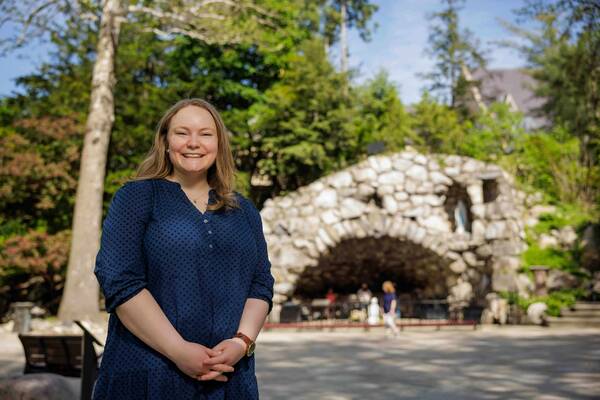
Deeply rooted in her faith, Bernadette views being a “different kind of lawyer” as an act of service, not as a means to personal glory or prestige. “Being a ‘different kind of lawyer’ means seeing your legal career as a way of serving God and God’s people. I see it as a way to serve God and the people around me,” she said.
After graduation, Bernadette will clerk with Judge Raymond Gruender on the United States Court of Appeals for the Eighth Circuit in St. Louis, Missouri for two years.
And, while she was the first in her family to attend law school, the Shaughnessy family will continue to make their mark at Notre Dame Law School. Her brother John just completed his first year here, and her brother Ambrose will begin his law school journey at Notre Dame this coming fall.
Arlinda Shehu
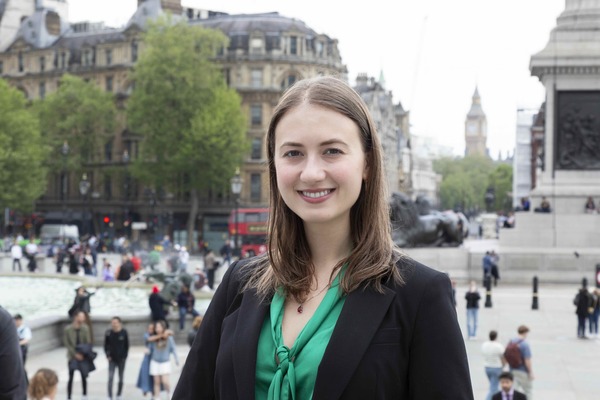
Arlinda Shehu and her family immigrated to the United States from Albania when she was 12 years old. In 1997, during a civil war, her father wrote to then-President Bill Clinton explaining their family’s economic situation and pleading for his family to come to America, offering to take on any kind of work. Although President Clinton never replied, Arlinda and her family eventually won a Green Card under the Diversity Visa Lottery program — a one-in-a-million chance.
However, Arlinda and her family faced significant challenges upon immigrating to the United States about 15 years ago.
“It was a very difficult transition,” Arlinda recalled. “None of us knew any English. We came during the 2008 recession, which meant that there were kids with degrees struggling to find jobs, let alone my parents who didn’t even speak English.”
“Throughout it all, of course, all my parents could say to me was that if I studied really hard and got good grades, something good would happen,” she said. “And of course, they were right.”
Arlinda graduated from Cornell University with a double major in philosophy and psychology and obtained her master's degree in philosophy from Columbia University. She pursued her graduate studies part-time while working full-time as a paralegal at a labor and employment firm before transferring to an asset management company.
“My path to law school was a zigzagging path. At one point, I considered going to business school or pursuing a Ph.D. in philosophy. This is one of the difficulties of being a first-generation student. You don’t get a lot of mentorship,” said Arlinda. “Ultimately, I realized with the work that I was doing at the law firm, that they were giving us a lot of responsibility. So I thought, ‘Well, maybe I can do what these lawyers are doing.’”
After completing her graduate degree and working as a paralegal for three years, Arlinda excelled at Notre Dame Law School. She spent the summer after her first year of law school working as a research assistant for Professor Paolo Carozza. During her second year, she completed a year-long externship with Judge Damon R. Leichty, U.S. District Court Judge for the Northern District of Indiana.
Arlinda spent the summer after her second year of law school working as a summer associate at Weil, Gotshal & Manges LLP in New York, where she will be working after graduation, specifically in the firm’s antitrust litigation group.
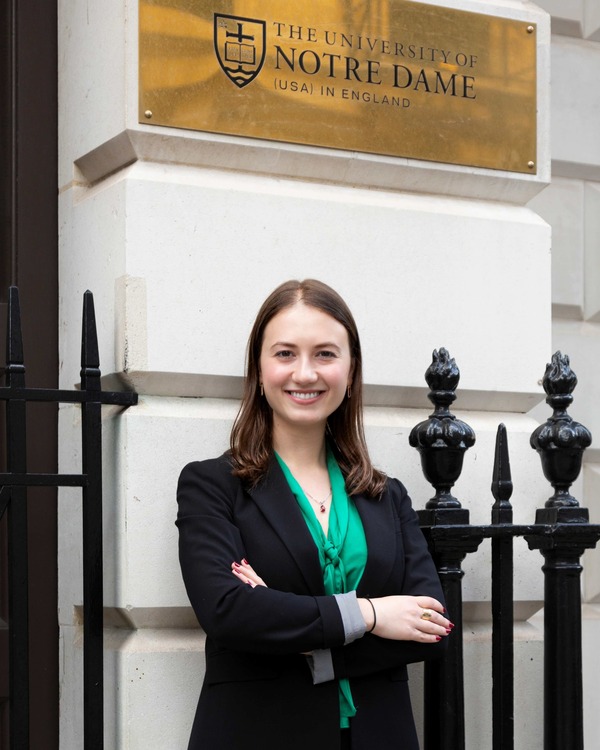
She spent her third year of law school at the Notre Dame London Law Programme, serving as the graduate residence fellow at Conway Hall and a semester representative for the law students. She was also a research assistant for Professor Mark Hill KC.
Throughout her law school journey, Arlinda has not forgotten her roots as a first-generation student, having served as president of the First Generation Professionals student organization. She credits the Law School for giving her the opportunity to share her background and serve as a mentor to others with diverse backgrounds through First Generation Professionals. She is thankful to the Law School for being so supportive of first-generation students.
“Being a ‘different kind of lawyer’ means being me — an immigrant kid from Albania who is going to be an attorney at a top law firm,” said Arlinda. “I never thought that I would be where I am today. The fact that I’ll be able to even call myself a lawyer is outstanding. It’s the greatest blessing.”
Arlinda is a first-generation college graduate. Her mother is a housekeeper, and her father was a janitor before he retired.
“The fact that I have this sort of socioeconomic background, this perspective, this work ethic that I bring to the legal field — that’s what being a ‘different kind of lawyer’ means to me.”
Will White
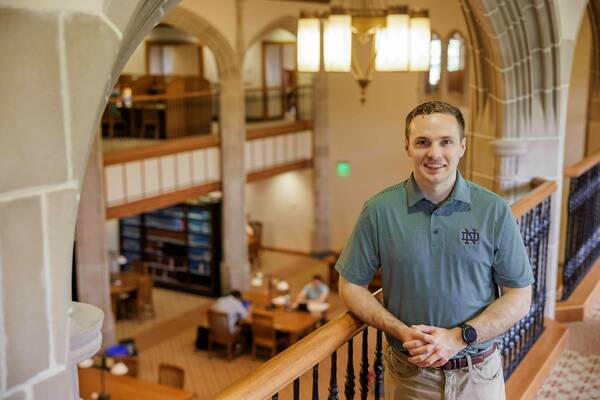
During his time at Notre Dame Law School, Will White has dedicated himself to service of his community, his family, and his country.
After graduating from the United States Military Academy at West Point in 2017, Will, a Houston native, was commissioned into the U.S. Army as an Infantry Officer. He was stationed in Fort Bragg, North Carolina (now Fort Liberty) and was deployed for nine months to Afghanistan with the 82nd Airborne Division.
“When I joined the Army, I didn’t really know that I wanted to pursue becoming a Judge Advocate. While on deployment, I had several meaningful experiences with Judge Advocates. They were always confident and seemed to know the right answer for soldiers and commanders,” he said. His experience with Judge Advocates led him to apply for an Army program that would allow him to earn a law degree while continuing to serve on Active Duty.
During his law school summers, Will worked for a military justice prosecution office with the JAG Corps at Fort McNair in Washington, D.C., and learned different legal areas as a legal intern at Fort Belvoir in Virginia, where he rotated among administrative law, legal assistance, labor and employment, and military justice prosecution offices.
While a student at Notre Dame Law School, Will has been involved with the Military Veteran Law Society and the Journal of International & Comparative Law. During his first year at the Law School, he also tutored middle school students at the Robinson Center.
While in law school, Will and his wife, Kristi, celebrated the birth of their first child, Anderson. Every weekend, Will travels to Pittsburgh, Pennsylvania, where his wife, who also serves as an Army Officer, is stationed.
“The support from my wife, who works a full-time job while raising our son, has been tremendous. I spend about three or four days a week here and the other time with them in Pittsburgh,” said Will. “Notre Dame has been very understanding and supportive in allowing me to succeed in law school while supporting a family.”
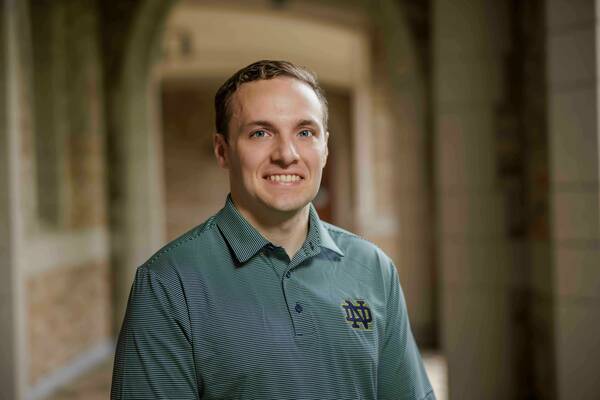
After graduation, Will plans to move back to Fort Liberty, North Carolina with his family to serve as a Judge Advocate in the Army. For him, being a “different kind of lawyer” has centered around knowing how best he can support other military Officers whose shoes he was once in.
Will said, “It’s not only knowing the law but being able to give guidance outside of the law to our clients. For me, it’s considering other ethical and moral implications when I give advice to soldiers or commanders. It’s something I take really seriously as I’ve been on the receiving end of that guidance as an Infantry Officer. That was always in the back of my mind as I was studying.”
Jamal Wilson
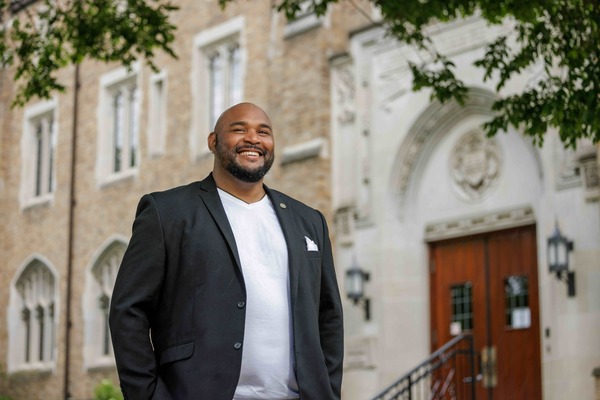
Growing up, Jamal Wilson wanted to play in the NFL. “Everybody knew that I was going to play football in college and potentially go pro,” said Jamal, a former Division 1 athlete from Compton, California.
His passions started to change during his senior year at the University of Montana. Sitting in class wearing half of his football practice gear, Jamal realized that he preferred attending his constitutional civil rights seminar over going to football practice.
As his passions evolved, Jamal began pursuing more activities that made his pathway to law school clearer. He explored the public interest route in college, actively addressing race relations on campus through his involvement in the Black Student Union. Jamal was in college while the Trayvon Martin case transpired, further fueling his interest in understanding the relationship between law and legislation in addressing America’s growing racial tension.
After graduating from college, Jamal worked in public policy for Senator Mike McGuire at the California State Senate in Sacramento, California. “My first time stepping foot in my state’s capitol building was on my first day of work,” he said. “Within weeks, I was meeting with senators and high-powered lobbyists. I learned the art of negotiation and developing your arguments strategically. I realized the power of using your position and combining your passions with developing solutions to problems. So, I told myself, ‘How much more effective can I be as an advocate for others?’” This realization led Jamal to Jovenes, Inc., where he worked with community colleges throughout Los Angeles County to provide housing to homeless students.
Jamal brought his diligent pursuit to analyze problems and develop solutions to Notre Dame. He served as a startup coach at the IDEA Center, where he helped students of all levels — from undergraduate freshmen to executive MBA students — flourish as entrepreneurs and navigate the complexities of developing a sustainable business model. Jamal was recently named Startup Coach of the Year.
He was also the student representative of the Notre Dame Faculty Board on Athletics, vice president of the Sports, Communication and Entertainment Law Forum, executive symposium editor for the Notre Dame Journal on Emerging Technologies, and alumni relations and professional development chair of the Notre Dame Black Law Students Association (BLSA).
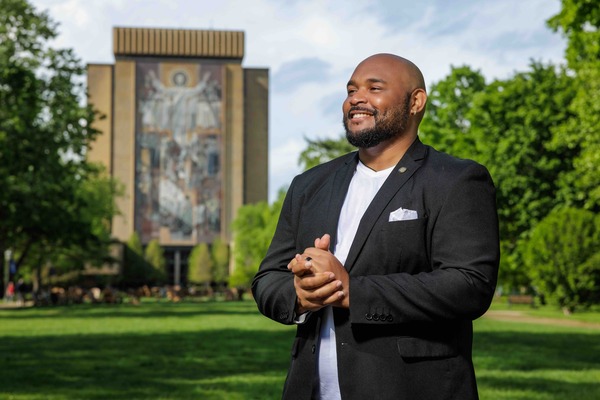
Reflecting on one of his favorite experiences at Notre Dame, Jamal said, “Through BLSA, we were able to partner with Magistrate Judge Andre Gammage to help South Bend residents, mainly Black and Brown residents, expunge their criminal records. That in and of itself proves how much power is in what we’re learning and doing here at Notre Dame.”
Following graduation, Jamal will serve as a law clerk at Fox Rothschild in Los Angeles, where he will focus on corporate or commercial transactions. “My goal is to be a trusted advisor for the most ambitious innovators and investors while also benefiting my community,” he said.
Jamal’s steadfast faith in God is core to everything he achieves. He does not make any decisions without praying first. “The Notre Dame community is a special place. It takes coming here and experiencing it for anybody to understand that you can be a vessel for God through helping people, helping the community, and helping society,” said Jamal. “I truly feel that coming here was my God-given purpose.”
Published and written by Arienne Calingo, Jonathan Bailey, Libbey Detcher, Sarah Doerr, and Denise Wager, Marketing Communications Department at Notre Dame Law School